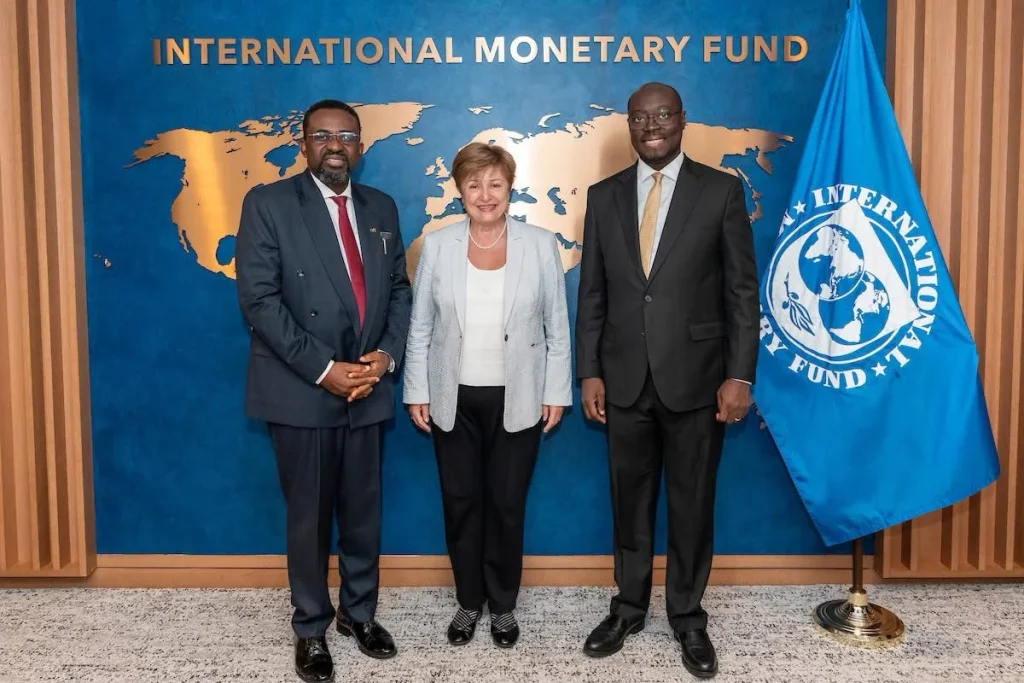Ghana’s economic future hinges on the upcoming fifth review of its $3 billion Extended Credit Facility (ECF) program with the International Monetary Fund (IMF), scheduled for September 29, 2025. This penultimate assessment carries significant weight, as it will determine the disbursement of a crucial $360 million tranche in October and gauge the country’s adherence to the program’s stringent targets, setting the stage for the final review in April 2026 and Ghana’s subsequent economic independence.
The IMF mission’s primary focus will be scrutinizing Ghana’s economic performance up to June 2025, paying particularly close attention to key indicators such as inflation control, reserve accumulation, and fiscal discipline. A central benchmark for success is the government’s ability to achieve a primary surplus of 1.5 percent of GDP. This target reflects the IMF’s emphasis on fiscal consolidation as a cornerstone of macroeconomic stability. The review team will analyze the government’s revenue mobilization efforts, expenditure controls, and progress towards debt sustainability, a core objective of the ECF arrangement.
Beyond the macroeconomic indicators, the IMF will also delve into critical structural issues plaguing the Ghanaian economy. These include mounting arrears in statutory funds like the National Health Insurance Levy (NHIL), the Ghana Education Trust Fund (GETFund), and the Road Fund. The review will assess the government’s efforts to address these arrears, which pose a threat to the long-term sustainability of crucial public services. Furthermore, the recapitalization of fragile banks and struggling state-owned institutions, such as the National Investment Bank, will be under scrutiny. The IMF recognizes that a healthy financial sector and efficient state-owned enterprises are essential for fostering private sector-led growth and overall economic stability.
Social protection programs will also be a key area of examination. The IMF will evaluate whether the government’s fiscal adjustment measures are being balanced with adequate safeguards for vulnerable groups. This reflects the IMF’s growing emphasis on social dimensions of its programs, ensuring that macroeconomic reforms do not disproportionately burden the most vulnerable segments of the population. The IMF will assess whether social safety nets are effectively protecting those most affected by the necessary economic adjustments.
A looming concern is Ghana’s ability to maintain fiscal discipline and sustain the reforms once the IMF program concludes in May 2026. Development partners have stressed the importance of building “shock absorbers” to prevent the country from slipping back into economic crisis after the program ends. They advocate for measures that enhance resilience to external shocks and ensure long-term stability. The government, however, maintains that the reforms implemented under the ECF, coupled with continued strict expenditure controls, are sufficient to keep the economy on a sustainable path. This confidence will be tested in the coming months and years as Ghana transitions away from IMF oversight.
The $3 billion ECF arrangement, approved in May 2023, was designed to address Ghana’s pressing economic challenges. The program aims to restore debt sustainability, rebuild foreign reserves depleted by external shocks, and implement crucial structural reforms to promote sustainable and inclusive growth. These reforms are centered around boosting revenue mobilization through enhanced tax collection and administration, strengthening public financial management to improve efficiency and transparency in government spending, and combating inflation to stabilize the economy. The program also emphasizes protecting financial stability by addressing weaknesses in the banking sector and creating conditions conducive to private sector-led growth, recognizing the private sector as the engine of job creation and economic development. With the September review representing a critical juncture, Ghana’s ability to demonstrate sustained progress towards these objectives will be paramount in securing the final tranche of funding and ensuring a smooth transition to a post-IMF era.


